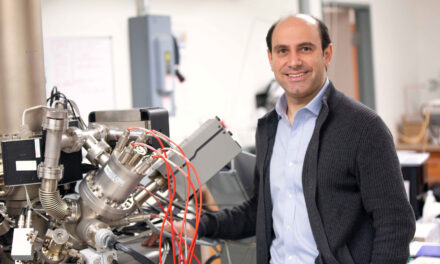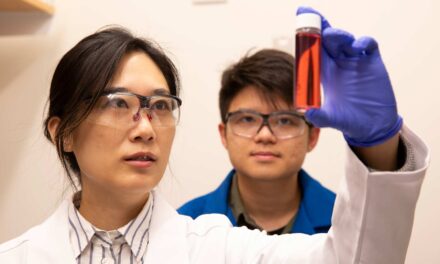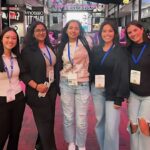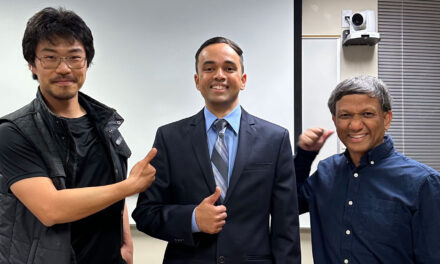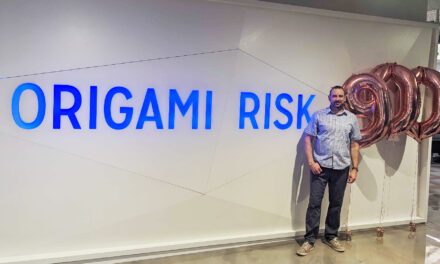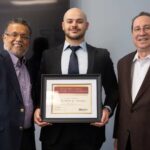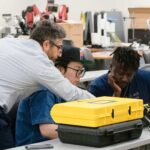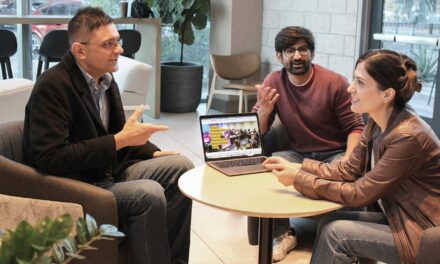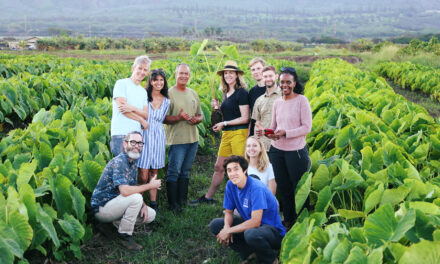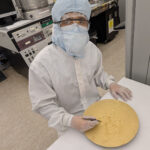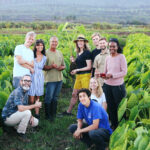
ASU venture Swift Coat wins big at Rice Business Plan Competition
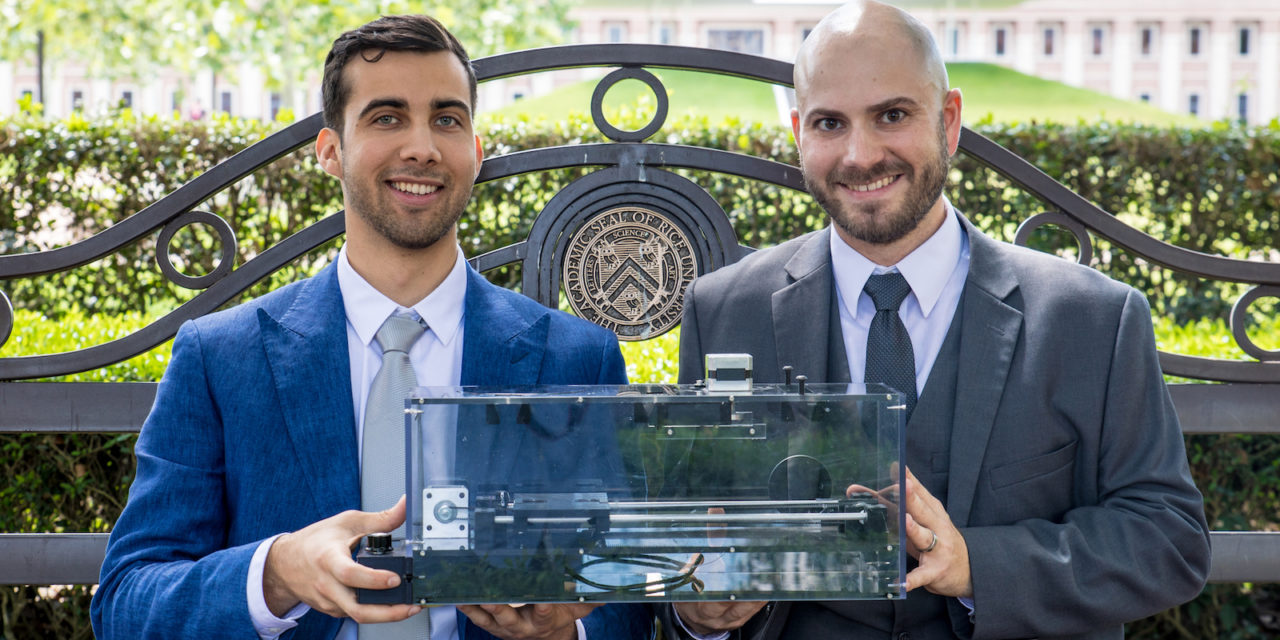
Above: Left to right, Jonathan Bryan, an electrical engineering doctoral student and Peter Firth, CEO of Swift Coat hold a model of Swift Coat’s nanoparticle deposition system on the Rice University campus in Houston, Texas. Photographer: Slyworks Photography
An Arizona State University tech startup took home more than $70,000 from the Rice Business Plan Competition, hosted by Rice University from April 6-8 in Houston, Texas.
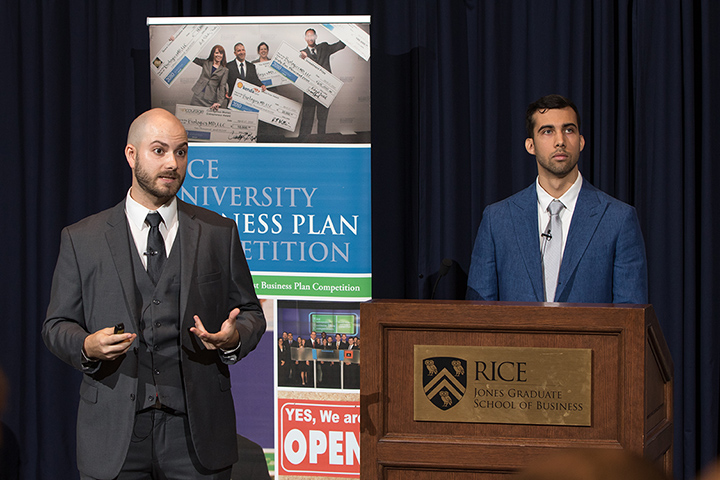
Left, Peter Firth, CEO of Swift Coat and Jonathan Bryan, an electrical engineering doctoral student, represented the ASU-incubated startup at the Rice Business Plan Competition, considered one of the top entrepreneurial competitions for graduate-level ventures. Photographer: Slyworks Photography
Swift Coat, a venture specializing in nanoparticle coatings, performed better than any ASU team to date, ultimately finishing in fourth place overall.
The brainchild of electrical engineering Assistant Professor Zachary Holman and graduate research associate Peter Firth, Swift Coat takes its name from proprietary deposition technology, which is capable of coating any surface with nanoparticles of varying compositions and sizes. The technology, which has applications in a range of industries, was developed through photovoltaic research in Holman’s lab.
Now in its seventeenth year, the Rice Business Plan Competition is considered the premier graduate-level entrepreneurial competition, drawing support from more than 180 corporate and private sponsors.
“Our first day at the RBPC, they told us that this wasn’t just a competition, but the most intense and condensed startup accelerator program in the country,” says Firth. “They weren’t kidding about that, and I can tell you that Swift Coat did not return to ASU the same company that traveled to Houston.”
The intensity of the competition is evident in its attrition rate. Only 42 applicants from more than 750 were selected to pitch their ideas at the competition. Swift Coat CEO Firth and doctoral student Jonathan Bryan represented the company at the competition, securing $5,000 as they were selected as one of six teams to advance to the finals. They went on to win a $50,000 Department of Energy Cleantech University Prize, $15,000 in patent attorney expenses and a $1,000 High School Judging Prize, totaling $71,000 in investments.
“We’re actually pretty proud of the high school judging prize,” says Firth. “Functional coatings don’t have the natural appeal that some of the medical or software startups have, so we felt pretty good that we were able to convince a bunch of young entrepreneurs that coatings are cool.”
Since its founding in 2016, Swift Coat has been a two-man operation, with Firth and Holman serving as the CEO and chief technology officer, respectively. But the rigorous format of Rice’s competition — a 15-minute presentation followed by a 20-minute Q&A from industry experts — made it clear it was time to expand their personnel.
“During our preparation, Zak and I very quickly realized that Swift Coat had grown beyond what two people can handle and that Jonathan was the person we needed to be successful,” says Firth.
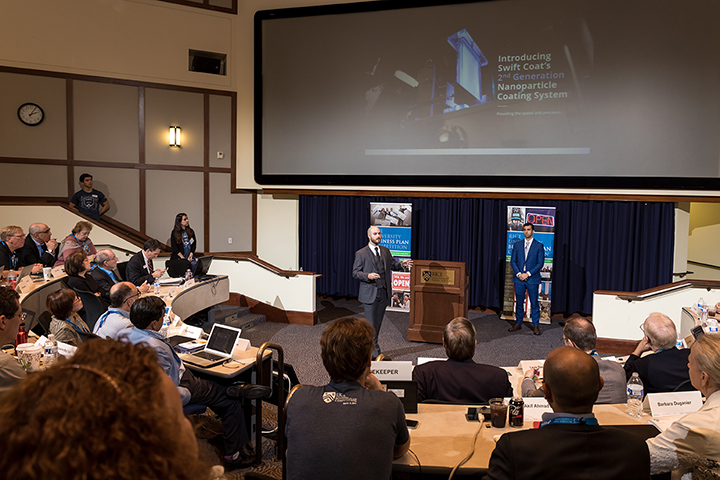
Peter Firth, center, and Jonathan Bryan pitch their startup at the Rice Business Plan Competition, held at Rice University in Houston, Texas, from April 6-8. Swift Coat advanced farther in the competition than any ASU team before, securing more than $70,000 with a fourth place finish and entrance into another entrepreneurial competition later this summer. Photographer: Slyworks Photography
With Bryan’s input, the team turned their presentation into a more aspirational pitch, painting an image of Swift Coat as a $100 million company with a vast array of products and applications.
“Just as people might start to think this company is too good to be true, Jonathan would step in and talk about the incredible results he has produced in the lab,” says Firth. “This dynamic really seemed to resonate at the competition.”
Swift Coat’s success in Houston comes on the heels of their laudable performance at ASU and Avnet’s inaugural ASU Innovation Open, which pitted nearly three dozen fledgling startups against one another for a grand prize of $100,000. Swift Coat advanced to the final four, winning the $5,000 Zero Mass Water Materials Award as well as the SRP Innovation Award worth an additional $10,000.
“I’m extremely proud of Peter and Jonathan’s excellent showing on behalf of Swift Coat and ASU,” says Holman. “I think their placement and recognition in this premier competition provides validation that Swift Coat has what it takes to be a successful company. We’ll use this momentum to attract new customers while ensuring that we deliver on our promises to our existing customers.”
In less than a year, Swift Coat has attracted more than $125,000 in funding, and they’ve already put those funds to good use. They’ve found their first customers — a large glass company and a leading solar cell manufacturing equipment supplier — and are hard at work completing a third-generation nanoparticle deposition tool.
Firth credits Swift Coat’s successes with ASU’s strong support of entrepreneurship, noting help from the Venture Devils program, and Brent Sebold and Ken Mulligan in particular, as invaluable.
“It’s been their guidance over the last year that helped a couple of guys from ASU beat out teams full of engineers and MBA’s from Harvard, Stanford and MIT!” says Firth.
In June, Swift Coat will head to the Department of Energy’s Cleantech UP National Competition. The event draws competitors from eight regional collegiate entrepreneurship competitions from across the nation to vie for a $100,000 grand prize. Swift Coat’s entry was secured with the Cleantech University Prize they won at the Rice competition.
“The day we got back from Houston, we were in the lab running experiments and generating data to showcase at the competition and take home another big prize for Swift Coat,” says Firth.


